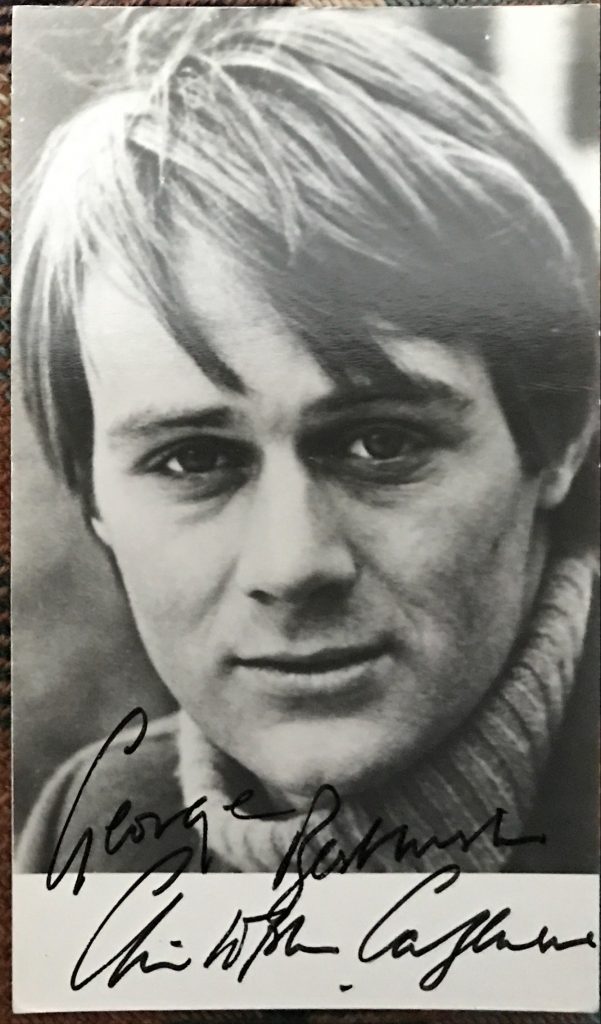
Christopher Cazenove was born in 1943 in Winchester, Hampshire. He starred in some very popular period dramas on television in the 1970’s including “The Regiment” and “The Duchess of Duke Street”. In the 1980’s he went to Hollywood to feature in “Dynasty” joining fellow Britons Joan Collins and Kate O’Mara. Recently he had featured in the popular court room series “Judge John Deed” on the BBC with Martin Shaw. His many films included “Royal Flash” in 1975, “East of Elephant Rock” in 1977 and “Eye of the Needle” in 1981. He died in 2010.
His “Guardian” obituary by David McKittrick:
Although he achieved a certain fame in the 1980s for his role as Ben Carrington, a scheming businessman in the glossy American soap Dynasty, he spent much of his career depicting Englishmen from aristocratic and often military backgrounds. His good looks, his charm and his upper-crust air – he went to Eton – meant he was often cast in upper-middle-class roles, often in costume dramas set around the beginning of the 20th century.
He once said ruefully: “When I started out, I had a game plan to end up with the Royal Shakespeare Company or the National Theatre. But The Regiment really put the kibosh on that. After that I was perceived as a total toff and too commercial. Perhaps that’s why I have never been offered a job at the RSC – or maybe it’s because they think I’m awful.”
But if he never reached the highest echelons of his craft he was much in demand in the theatre, on television and occasionally in films. A typical role in later life saw him playing Professor Henry Higgins on stage in My Fair Lady.
His versatility was such that he could play both the sophisticated hero and the low-down scoundrel. In Dynasty, which made him a household name in the mid-1980s, he played “a real cad.” He observed: “Playing a nasty gives one a much better chance – nasty characters are so much more interesting than wimps.”
He enthused of Dynasty: “I’ve always adored the series. Way over the top it may be, but it’s wonderful escapism and great fun.” He also marvelled at the money, which was way beyond anything available over here.
He credited Joan Collins with helping him gain entrance into the US movie scene. “Before Joan made such an enormous impact in Dynasty, a true Brit accent wasn’t a particular advantage in Hollywood,” he said. “I know, because I spent three years trying to break in as a foreigner, with scarcely any luck at all.”
Cazenove described himself as a rule-breaker at Eton. His worst memory was being caned: “All six prefects were there to witness the beating,” he recalled. “I’ll never forget the humiliation of bending over to touch my toes while this boy gave me six of the best.”
He worked as a nanny, a teacher, a cinema attendant and a chauffeur in France before training as an actor at the Bristol Old Vic theatre school. In 1973 he married Angharad Rees, who like him was well-known for playing period parts. Her role in the popular series Poldark made her a major television figure.
Although their marriage lasted two decades, it included lengthy periods of separation. In a number of frank interviews after their divorce, Cazenove looked back: “I enjoyed being married very much. We still love each other very much – we just find it difficult to live together. We are very good friends and I think we probably have the best of all possible worlds now. I don’t regret anything.”
The couple’s post-divorce relationship was so good that friends hoped they might get together again, but Cazenove said: “I know there are people just dying for us to get married again, but it’s not going to happen.”
The great tragedy for the couple came in 1999, five years after their divorce, when their eldest son Linford died in a car accident. He had just completed his education and was intent on a career in the theatre.
Cazenove said of his death: “If he had to go, he went at an incredibly good time, if I can put it that way. He was on such a high. He had just got his master’s degree at Cambridge University and was so happy, so excited, at forming his own theatre company.
“I don’t think I have suppressed any feelings of anger or bitterness. I have let it go. Many tears have been shed and are still being shed. That’s the way it should be.”
Cazenove’s companion for almost a decade before his death was his partner Isabel Davis. She and members of his family, including his surviving son Rhys, were at his hospital bedside when he died of the blood disorder septicaemia.
A statement from the family and Davis said: “All who knew and loved him will be devastated by the loss of this incredible man who touched so many lives.”
David McKittrick
The “Guardian” obituary can be accessed here.

